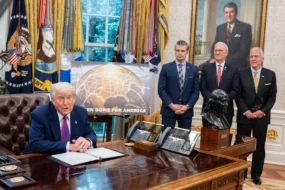This opinion piece is written by Nicholas Francoeur, an active-duty officer in the US Space Force. Most recently, he was the director of LEO and GEO operations, and was previously a senior range operations commander at Cape Canaveral. These views are his own, and do not represent the views of Payload or the military.
As space becomes a bucket list vacation destination for the rich and famous, it’s worth asking: is investing in space tourism really the best use of resources amid the very real and immediate threats in orbit?
My answer is, definitively, yes.
Space tourism encapsulates a quintessentially American value—the pioneer spirit. It’s a concept that resonates with almost everyone, even those outside the space industry. It’s also the latest example in a long line of instances where commercial investment benefits national security priorities and vice versa.
A history of cooperation: This realization hit me at an Air Force Academy football game my freshman year, where the Boeing logo on the scoreboard underscored the integration of our nation’s military with the commercial sector.
Despite recently beginning to serve in the military, for which Boeing is a top contractor, I realized that most of my exposure to the company was through commercial air travel: an $800B+ industry, bearing testimony to the reciprocal benefits between civilian and military enterprises.
While Boeing’s first job was building seaplanes for naval observation and patrol during World War I, no one today would believe that their development of commercial air travel in the early 1930s was wasted effort. That investment in commercial tech both allowed private air travel to flourish and laid the groundwork for future innovations in military aircraft during the following decade.
Commercial aviation may have developed tech that ultimately helped the military, but it also led to the betterment of society more broadly. This is precisely what space tourism represents in the present Third Space Age.
Eyes on the future: The evolving space travel landscape also creates opportunities for businesses to establish industrial strongholds that can support them in times of both peace and conflict. These opportunities also offer investors a chance to bet on the space tourism industry without compromising advancements in the defense sector.
We can keep eyes on the serious threats space assets face while also remembering the inspiration sparked by space travel. Even if the dream of space tourism fails, companies like Blue Origin and Virgin Galactic will have kindled the flames of inspiration in the next generation of space professionals.
It’s tempting within the defense community to focus only on immediate concerns and solely prioritize security in space over the fun and excitement offered by tourism in orbit.
But we should—and must—resist such temptation, instead letting our inner space explorer continue to look to the stars in wonder.




